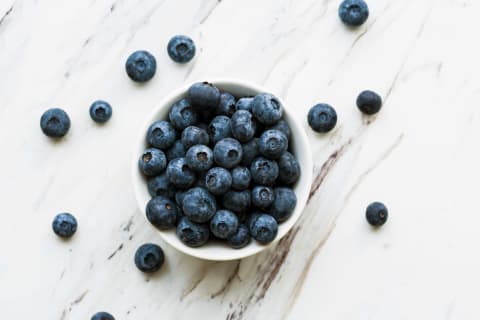Everything You Ever Wanted To Know About Antioxidants


You sip on matcha every morning, pile on the veggies, and end the night with a square of dark chocolate—all in pursuit of the all-powerful antioxidants (and because these foods are all delicious!). But what are antioxidants, really—and why are they so healthy?
Over the last 20 years, antioxidants have reached celebrity status in the wellness world, credited with fending off chronic diseases and cognitive decline, all while keeping our skin smooth and supple. They are what give superfoods their "super" powers and have even found their way into our bathroom cabinets with antioxidant skin care products and toothpaste. Now, let's dive into the science behind the buzzword—how antioxidants work, why you need them, and where to find them.
What are free radicals, and how do antioxidants fight them?
For starters, there isn't just one "antioxidant." Antioxidant is a category of molecules encompassing hundreds of different vitamins, minerals, and other compounds, including vitamin C, vitamin E, glutathione, melatonin, CoQ10, alpha lipoic acid, and more. Some antioxidants are made by the body, but most are absorbed from the food we eat. According to Olivia Neely, RDN, L.D., "Antioxidants protect our cells from harmful free radicals and include dozens of food-based substances you may have heard of before, like beta-carotene, lycopene, and vitamin C. Food sources of antioxidants protect the body from damage done by things like a poor diet, taking medications, and even high amounts of stress."
In more detail, antioxidants act as a defense system in the body against free radical damage and oxidative stress. Free radicals are reactive molecules that are formed as a by-product of normal chemical reactions in the body. Everything from pollution to some foods, and even breathing, generate the production of free radicals. Don't stop breathing, though—contrary to popular belief, some free radicals are OK and even beneficial. Free radicals support the heart in times of stress, play an important role in cell signaling1, and can help the immune system2 fight off bacteria.
It's when there are too many free radicals that it becomes a problem. Free radicals can damage cells, mess with DNA, and impair mitochondrial function. This is because they have an unpaired electron and they want to find it a pair—badly. Basically, electrons need to be all paired up in order for a molecule to be stable and happy. During normal chemical reactions and processes, free radicals have lost one of their electrons, making them highly reactive and unstable. In an attempt to pair off their lonely electron, free radicals try to steal one from our healthy cells, damaging the cell in the process. Over time, this damage, called oxidative stress, can degrade cells and leave them susceptible to cardiovascular disease3, neurodegenerative disorders, and cancer.
That's where antioxidants come in. They are the body's natural defense system against free radicals. Antioxidants offer up one of their electrons to the free radicals, neutralizing the free radical and preventing damage to our cells. They are pretty good at it, too, stopping up to 99 percent of free radicals4 from damaging our cells. By protecting our cells3, antioxidants keep chronic diseases at bay and increase health and longevity5. Aging, pollution, stress, and pesticides can ramp up free radical production, though—not to mention our modern diet, with too much fried food6 and processed meat7—and it can be hard for our body to keep up. Especially if you aren't consuming enough antioxidant-rich foods.
Where to find antioxidants—and how to get the most out of them.

The best way to boost your antioxidant system is by eating a healthy diet full of fruits, vegetables, and whole grains. Although animal products have a small amount of antioxidants, they are primarily found in plants8. Particularly rich sources include green tea, blueberries, even spices like clove and cinnamon8—and of course superfoods like acai, goji berries, and hemp seeds. You can't just load up on acai and call it a day, though. Remember, there are hundreds of different types of antioxidants, and they all have unique characteristics. Different antioxidants work in distinct ways and in different parts of the body. Some even work better together9. For instance, vitamin C boosts vitamin E's ability to disarm free radicals. The goal is to consume a diverse diet full of plant-based foods to get a good variety of antioxidants every day.
Some of our favorites antioxidant-rich foods are:
- Blueberries
- Chocolate
- Kale
- Avocado
- Coffee
- Matcha
- Walnuts
- Tomatoes
- Mangoes
Wanting to narrow it down? According to Neely, her "top favorites" are blueberries—"which contain anthocyanins that actually change the way brain neurons communicate and prevent neuron-damaging inflammation"—goji berries, cilantro, and dark chocolate.
There are some things you can do to maximize the antioxidant content of these foods to get even more bang for your buck. Don't get us wrong, vegetables are always a good choice, but how you prepare them, and what you pair them with, can make a huge difference. For the most part, raw is the way to go. Soaking, boiling, and low-slow heat can break down the antioxidants in your food10. Even chopping and peeling can cut the amount of antioxidants you are getting, so eat those peels11! One exception: tomatoes. Cooking tomatoes, and pairing them with olive oil, actually boosts their lycopene content, an important antioxidant that has been associated with reducing prostate cancer risk.
Another great way to get more antioxidants: turmeric. This amazing golden spice, typically used in Indian cuisine and now found at your local coffee shop in golden milk, not only acts as an antioxidant itself, but it also boosts your body's own antioxidants. Curcumin, the active ingredient in turmeric, triggers the production of antioxidants in the body. Just don't forget the pepper, which makes curcumin up to 2,000 percent more bioavailable12. Try this probiotic turmeric soda for a delicious way to add this spice to your day.
Interestingly, eating your antioxidants isn't the only way to get them. Some antioxidants may actually be more readily absorbed through the skin13, rather than being broken down in the digestive tract. This is especially important if you are looking to reap some of the skin-healing benefits of antioxidants. Topical antioxidant skin creams can help you get that glow.
Other benefits of antioxidants.
OK, so antioxidants are obviously important for long-term health, but what else can they do for you? Beyond fighting off cancer, neurodegeneration, and other chronic diseases, these magic little compounds can have some more immediate health effects, as well. If you're looking for more immediate, tangible benefits: Antioxidants can keep your skin smooth and wrinkle-free. Some, like melatonin, can also improve sleep and digestion14, something we could all probably benefit from. Other antioxidants, like glutathione, support detoxification and boost overall health. In addition, antioxidant-rich foods tend to be higher in other good-for-you nutrients, like fiber, unsaturated fat, and phytonutrients. Moral of the story? Incorporating more antioxidants into your diet is an all-around healthy move.

Darcy McDonough, M.S., is the Senior Manager, SEO & Content Strategy at mindbodygreen. She holds a master’s degree in nutrition interventions, communication, and behavior change from Tufts Friedman School of Nutrition Science and Policy. She has previously worked in nutrition communications for Joy Bauer, the nutrition and health expert for NBC’s TODAY Show.
McDonough has developed & lead nutrition education programming in schools. She’s covered a wide range of topics as a health & nutrition reporter from the rise in the use of psychedelics for depression to the frustrating trend in shorter doctors' appointments and the connection between diet and disease.
14 Sources
- https://www.ncbi.nlm.nih.gov/pmc/articles/PMC3520038/
- https://www.ncbi.nlm.nih.gov/pubmed/10807157
- https://www.eatright.org/food/vitamins-and-supplements/types-of-vitamins-and-nutrients/antioxidants-protecting-healthy-cells
- https://www.sciencedirect.com/science/article/pii/S026156140400175X
- https://www.sciencedirect.com/science/article/pii/S089158490000246X
- https://www.ncbi.nlm.nih.gov/pubmed/7704185
- https://www.ncbi.nlm.nih.gov/pmc/articles/PMC2121650/#pmed-0040345-b009
- https://www.ncbi.nlm.nih.gov/pmc/articles/PMC5297730/
- https://www.ncbi.nlm.nih.gov/pmc/articles/PMC3249911/#ref6
- https://www.ncbi.nlm.nih.gov/pmc/articles/PMC3866734/
- https://www.sciencedirect.com/science/article/pii/S0271531703001842
- https://www.ncbi.nlm.nih.gov/pubmed/9619120
- https://www.ncbi.nlm.nih.gov/pmc/articles/PMC5514576/
- https://www.ncbi.nlm.nih.gov/pmc/articles/PMC3949259/